Critical Reflection on Health and Social Care: A Case Study Analysis
VerifiedAdded on 2022/08/19
|7
|2247
|11
Report
AI Summary
This assignment is a critical reflection on a health and social care scenario involving an 80-year-old patient, Mrs. Bella Cullen, admitted to a geriatric ward following a stroke and diagnosed with dementia. The student utilizes Gibb's reflective model to analyze the experience, focusing on the challenges of providing care to a patient with cognitive impairments and social interaction issues. The reflection details the patient's medical history, difficulties with treatment due to her condition, and the student's emotional and professional responses. The assignment explores the positive aspects of the experience, such as gaining insight into human dynamics and handling diverse patients, alongside the negative aspects, including the patient's resistance to care. The reflection concludes with an action plan for future practice, emphasizing the importance of therapeutic communication and kindness in geriatric care. References to relevant literature are provided, and the reflection underscores the student's learning and growth in the field of health and social care.
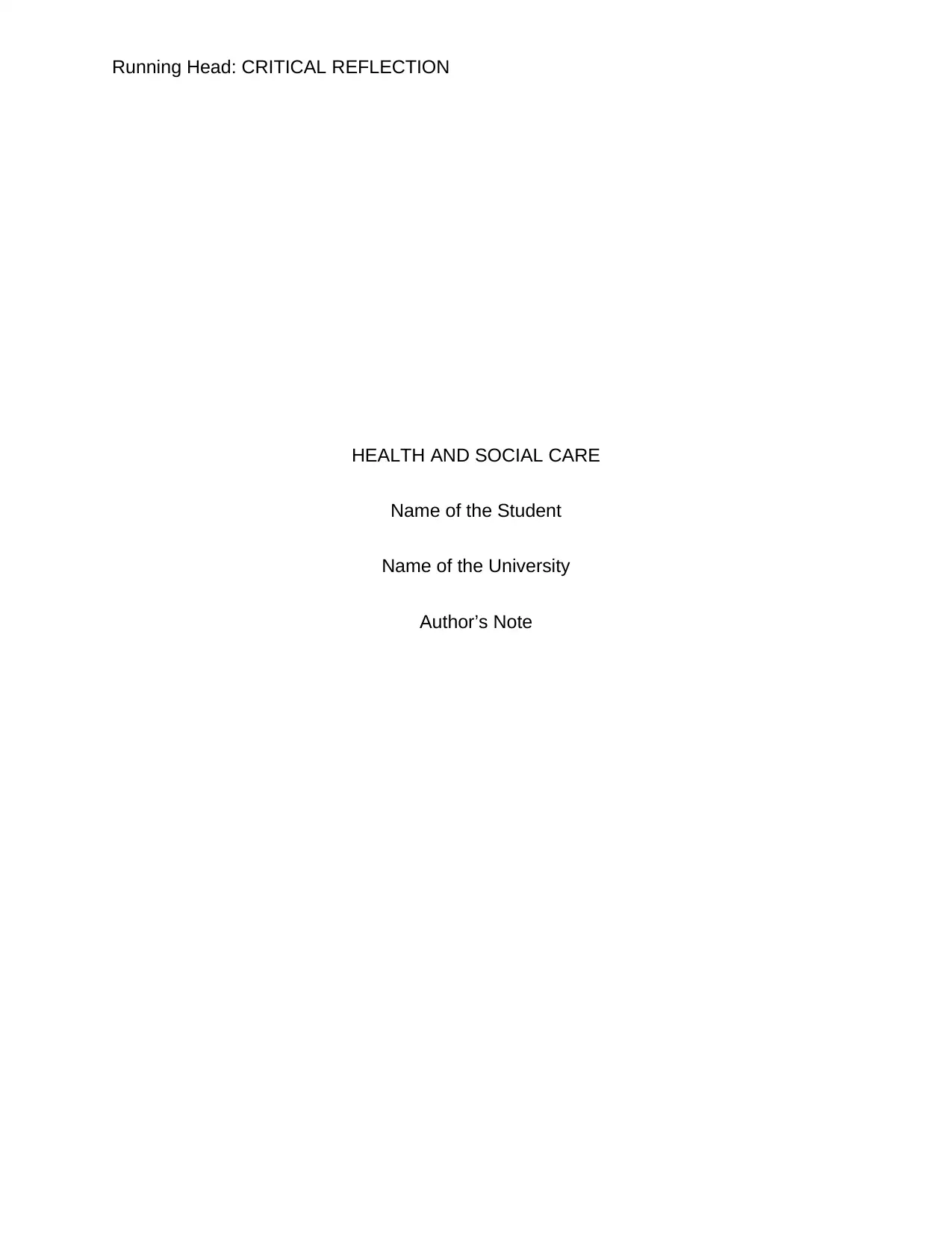
Running Head: CRITICAL REFLECTION
HEALTH AND SOCIAL CARE
Name of the Student
Name of the University
Author’s Note
HEALTH AND SOCIAL CARE
Name of the Student
Name of the University
Author’s Note
Paraphrase This Document
Need a fresh take? Get an instant paraphrase of this document with our AI Paraphraser
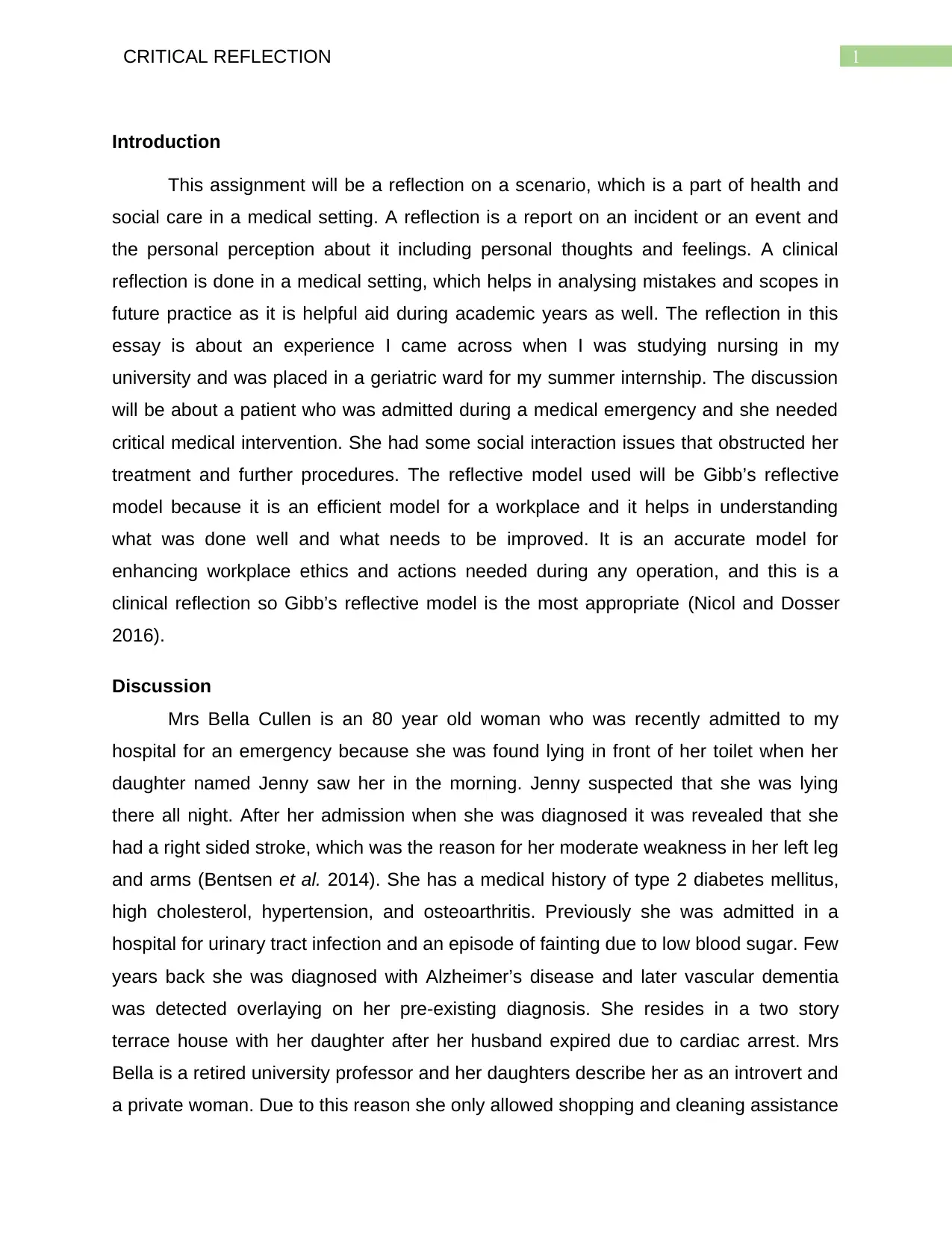
1CRITICAL REFLECTION
Introduction
This assignment will be a reflection on a scenario, which is a part of health and
social care in a medical setting. A reflection is a report on an incident or an event and
the personal perception about it including personal thoughts and feelings. A clinical
reflection is done in a medical setting, which helps in analysing mistakes and scopes in
future practice as it is helpful aid during academic years as well. The reflection in this
essay is about an experience I came across when I was studying nursing in my
university and was placed in a geriatric ward for my summer internship. The discussion
will be about a patient who was admitted during a medical emergency and she needed
critical medical intervention. She had some social interaction issues that obstructed her
treatment and further procedures. The reflective model used will be Gibb’s reflective
model because it is an efficient model for a workplace and it helps in understanding
what was done well and what needs to be improved. It is an accurate model for
enhancing workplace ethics and actions needed during any operation, and this is a
clinical reflection so Gibb’s reflective model is the most appropriate (Nicol and Dosser
2016).
Discussion
Mrs Bella Cullen is an 80 year old woman who was recently admitted to my
hospital for an emergency because she was found lying in front of her toilet when her
daughter named Jenny saw her in the morning. Jenny suspected that she was lying
there all night. After her admission when she was diagnosed it was revealed that she
had a right sided stroke, which was the reason for her moderate weakness in her left leg
and arms (Bentsen et al. 2014). She has a medical history of type 2 diabetes mellitus,
high cholesterol, hypertension, and osteoarthritis. Previously she was admitted in a
hospital for urinary tract infection and an episode of fainting due to low blood sugar. Few
years back she was diagnosed with Alzheimer’s disease and later vascular dementia
was detected overlaying on her pre-existing diagnosis. She resides in a two story
terrace house with her daughter after her husband expired due to cardiac arrest. Mrs
Bella is a retired university professor and her daughters describe her as an introvert and
a private woman. Due to this reason she only allowed shopping and cleaning assistance
Introduction
This assignment will be a reflection on a scenario, which is a part of health and
social care in a medical setting. A reflection is a report on an incident or an event and
the personal perception about it including personal thoughts and feelings. A clinical
reflection is done in a medical setting, which helps in analysing mistakes and scopes in
future practice as it is helpful aid during academic years as well. The reflection in this
essay is about an experience I came across when I was studying nursing in my
university and was placed in a geriatric ward for my summer internship. The discussion
will be about a patient who was admitted during a medical emergency and she needed
critical medical intervention. She had some social interaction issues that obstructed her
treatment and further procedures. The reflective model used will be Gibb’s reflective
model because it is an efficient model for a workplace and it helps in understanding
what was done well and what needs to be improved. It is an accurate model for
enhancing workplace ethics and actions needed during any operation, and this is a
clinical reflection so Gibb’s reflective model is the most appropriate (Nicol and Dosser
2016).
Discussion
Mrs Bella Cullen is an 80 year old woman who was recently admitted to my
hospital for an emergency because she was found lying in front of her toilet when her
daughter named Jenny saw her in the morning. Jenny suspected that she was lying
there all night. After her admission when she was diagnosed it was revealed that she
had a right sided stroke, which was the reason for her moderate weakness in her left leg
and arms (Bentsen et al. 2014). She has a medical history of type 2 diabetes mellitus,
high cholesterol, hypertension, and osteoarthritis. Previously she was admitted in a
hospital for urinary tract infection and an episode of fainting due to low blood sugar. Few
years back she was diagnosed with Alzheimer’s disease and later vascular dementia
was detected overlaying on her pre-existing diagnosis. She resides in a two story
terrace house with her daughter after her husband expired due to cardiac arrest. Mrs
Bella is a retired university professor and her daughters describe her as an introvert and
a private woman. Due to this reason she only allowed shopping and cleaning assistance
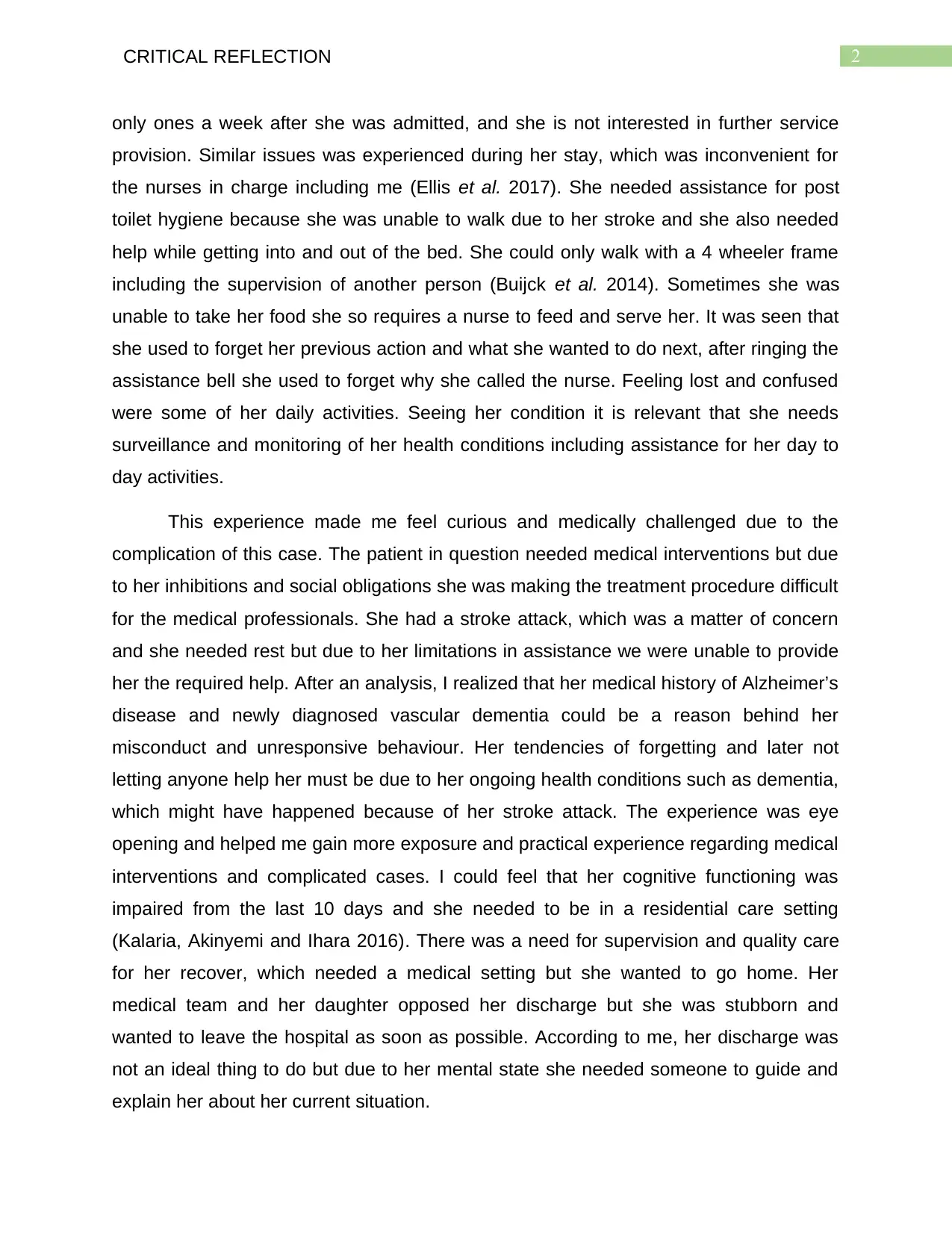
2CRITICAL REFLECTION
only ones a week after she was admitted, and she is not interested in further service
provision. Similar issues was experienced during her stay, which was inconvenient for
the nurses in charge including me (Ellis et al. 2017). She needed assistance for post
toilet hygiene because she was unable to walk due to her stroke and she also needed
help while getting into and out of the bed. She could only walk with a 4 wheeler frame
including the supervision of another person (Buijck et al. 2014). Sometimes she was
unable to take her food she so requires a nurse to feed and serve her. It was seen that
she used to forget her previous action and what she wanted to do next, after ringing the
assistance bell she used to forget why she called the nurse. Feeling lost and confused
were some of her daily activities. Seeing her condition it is relevant that she needs
surveillance and monitoring of her health conditions including assistance for her day to
day activities.
This experience made me feel curious and medically challenged due to the
complication of this case. The patient in question needed medical interventions but due
to her inhibitions and social obligations she was making the treatment procedure difficult
for the medical professionals. She had a stroke attack, which was a matter of concern
and she needed rest but due to her limitations in assistance we were unable to provide
her the required help. After an analysis, I realized that her medical history of Alzheimer’s
disease and newly diagnosed vascular dementia could be a reason behind her
misconduct and unresponsive behaviour. Her tendencies of forgetting and later not
letting anyone help her must be due to her ongoing health conditions such as dementia,
which might have happened because of her stroke attack. The experience was eye
opening and helped me gain more exposure and practical experience regarding medical
interventions and complicated cases. I could feel that her cognitive functioning was
impaired from the last 10 days and she needed to be in a residential care setting
(Kalaria, Akinyemi and Ihara 2016). There was a need for supervision and quality care
for her recover, which needed a medical setting but she wanted to go home. Her
medical team and her daughter opposed her discharge but she was stubborn and
wanted to leave the hospital as soon as possible. According to me, her discharge was
not an ideal thing to do but due to her mental state she needed someone to guide and
explain her about her current situation.
only ones a week after she was admitted, and she is not interested in further service
provision. Similar issues was experienced during her stay, which was inconvenient for
the nurses in charge including me (Ellis et al. 2017). She needed assistance for post
toilet hygiene because she was unable to walk due to her stroke and she also needed
help while getting into and out of the bed. She could only walk with a 4 wheeler frame
including the supervision of another person (Buijck et al. 2014). Sometimes she was
unable to take her food she so requires a nurse to feed and serve her. It was seen that
she used to forget her previous action and what she wanted to do next, after ringing the
assistance bell she used to forget why she called the nurse. Feeling lost and confused
were some of her daily activities. Seeing her condition it is relevant that she needs
surveillance and monitoring of her health conditions including assistance for her day to
day activities.
This experience made me feel curious and medically challenged due to the
complication of this case. The patient in question needed medical interventions but due
to her inhibitions and social obligations she was making the treatment procedure difficult
for the medical professionals. She had a stroke attack, which was a matter of concern
and she needed rest but due to her limitations in assistance we were unable to provide
her the required help. After an analysis, I realized that her medical history of Alzheimer’s
disease and newly diagnosed vascular dementia could be a reason behind her
misconduct and unresponsive behaviour. Her tendencies of forgetting and later not
letting anyone help her must be due to her ongoing health conditions such as dementia,
which might have happened because of her stroke attack. The experience was eye
opening and helped me gain more exposure and practical experience regarding medical
interventions and complicated cases. I could feel that her cognitive functioning was
impaired from the last 10 days and she needed to be in a residential care setting
(Kalaria, Akinyemi and Ihara 2016). There was a need for supervision and quality care
for her recover, which needed a medical setting but she wanted to go home. Her
medical team and her daughter opposed her discharge but she was stubborn and
wanted to leave the hospital as soon as possible. According to me, her discharge was
not an ideal thing to do but due to her mental state she needed someone to guide and
explain her about her current situation.
⊘ This is a preview!⊘
Do you want full access?
Subscribe today to unlock all pages.

Trusted by 1+ million students worldwide
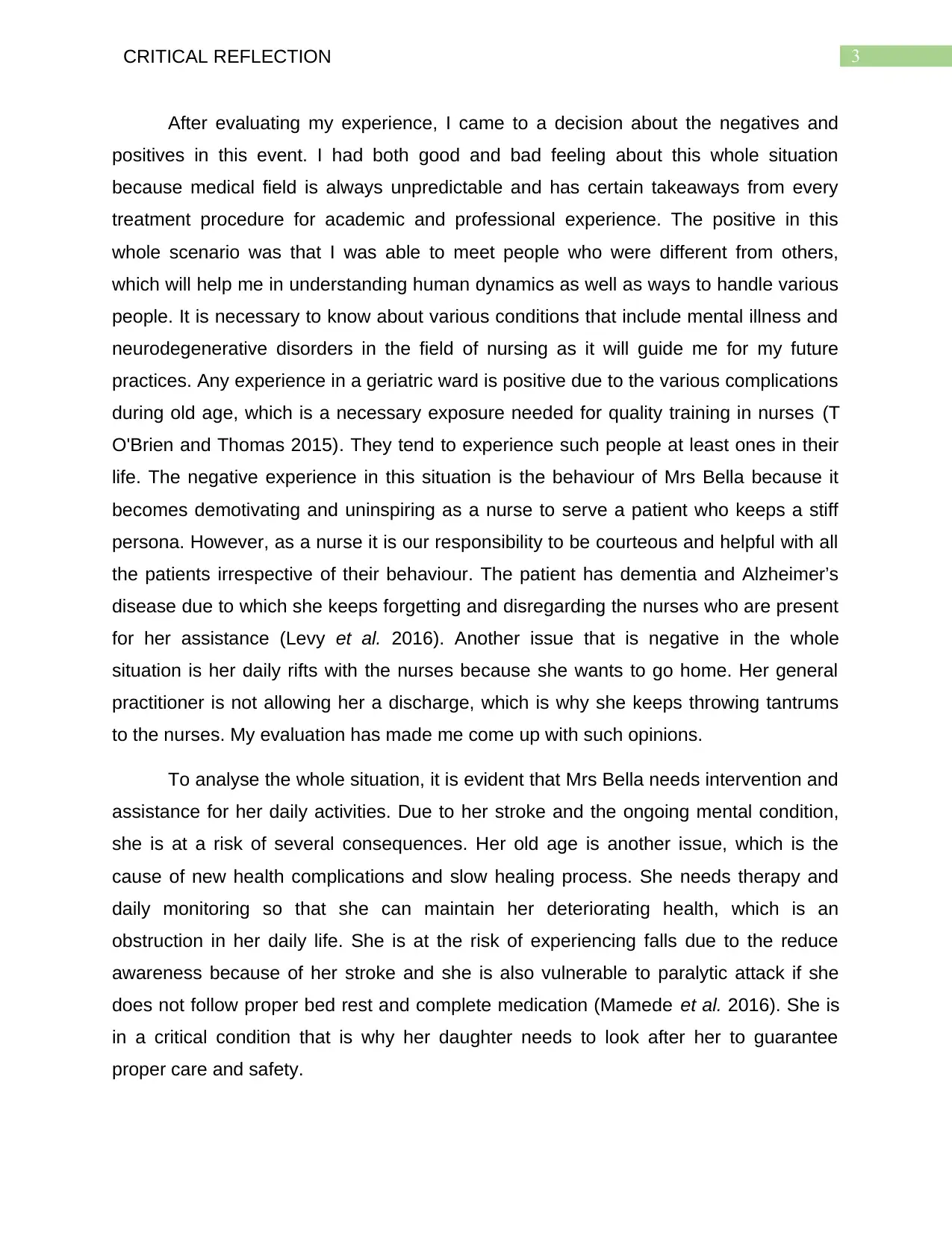
3CRITICAL REFLECTION
After evaluating my experience, I came to a decision about the negatives and
positives in this event. I had both good and bad feeling about this whole situation
because medical field is always unpredictable and has certain takeaways from every
treatment procedure for academic and professional experience. The positive in this
whole scenario was that I was able to meet people who were different from others,
which will help me in understanding human dynamics as well as ways to handle various
people. It is necessary to know about various conditions that include mental illness and
neurodegenerative disorders in the field of nursing as it will guide me for my future
practices. Any experience in a geriatric ward is positive due to the various complications
during old age, which is a necessary exposure needed for quality training in nurses (T
O'Brien and Thomas 2015). They tend to experience such people at least ones in their
life. The negative experience in this situation is the behaviour of Mrs Bella because it
becomes demotivating and uninspiring as a nurse to serve a patient who keeps a stiff
persona. However, as a nurse it is our responsibility to be courteous and helpful with all
the patients irrespective of their behaviour. The patient has dementia and Alzheimer’s
disease due to which she keeps forgetting and disregarding the nurses who are present
for her assistance (Levy et al. 2016). Another issue that is negative in the whole
situation is her daily rifts with the nurses because she wants to go home. Her general
practitioner is not allowing her a discharge, which is why she keeps throwing tantrums
to the nurses. My evaluation has made me come up with such opinions.
To analyse the whole situation, it is evident that Mrs Bella needs intervention and
assistance for her daily activities. Due to her stroke and the ongoing mental condition,
she is at a risk of several consequences. Her old age is another issue, which is the
cause of new health complications and slow healing process. She needs therapy and
daily monitoring so that she can maintain her deteriorating health, which is an
obstruction in her daily life. She is at the risk of experiencing falls due to the reduce
awareness because of her stroke and she is also vulnerable to paralytic attack if she
does not follow proper bed rest and complete medication (Mamede et al. 2016). She is
in a critical condition that is why her daughter needs to look after her to guarantee
proper care and safety.
After evaluating my experience, I came to a decision about the negatives and
positives in this event. I had both good and bad feeling about this whole situation
because medical field is always unpredictable and has certain takeaways from every
treatment procedure for academic and professional experience. The positive in this
whole scenario was that I was able to meet people who were different from others,
which will help me in understanding human dynamics as well as ways to handle various
people. It is necessary to know about various conditions that include mental illness and
neurodegenerative disorders in the field of nursing as it will guide me for my future
practices. Any experience in a geriatric ward is positive due to the various complications
during old age, which is a necessary exposure needed for quality training in nurses (T
O'Brien and Thomas 2015). They tend to experience such people at least ones in their
life. The negative experience in this situation is the behaviour of Mrs Bella because it
becomes demotivating and uninspiring as a nurse to serve a patient who keeps a stiff
persona. However, as a nurse it is our responsibility to be courteous and helpful with all
the patients irrespective of their behaviour. The patient has dementia and Alzheimer’s
disease due to which she keeps forgetting and disregarding the nurses who are present
for her assistance (Levy et al. 2016). Another issue that is negative in the whole
situation is her daily rifts with the nurses because she wants to go home. Her general
practitioner is not allowing her a discharge, which is why she keeps throwing tantrums
to the nurses. My evaluation has made me come up with such opinions.
To analyse the whole situation, it is evident that Mrs Bella needs intervention and
assistance for her daily activities. Due to her stroke and the ongoing mental condition,
she is at a risk of several consequences. Her old age is another issue, which is the
cause of new health complications and slow healing process. She needs therapy and
daily monitoring so that she can maintain her deteriorating health, which is an
obstruction in her daily life. She is at the risk of experiencing falls due to the reduce
awareness because of her stroke and she is also vulnerable to paralytic attack if she
does not follow proper bed rest and complete medication (Mamede et al. 2016). She is
in a critical condition that is why her daughter needs to look after her to guarantee
proper care and safety.
Paraphrase This Document
Need a fresh take? Get an instant paraphrase of this document with our AI Paraphraser
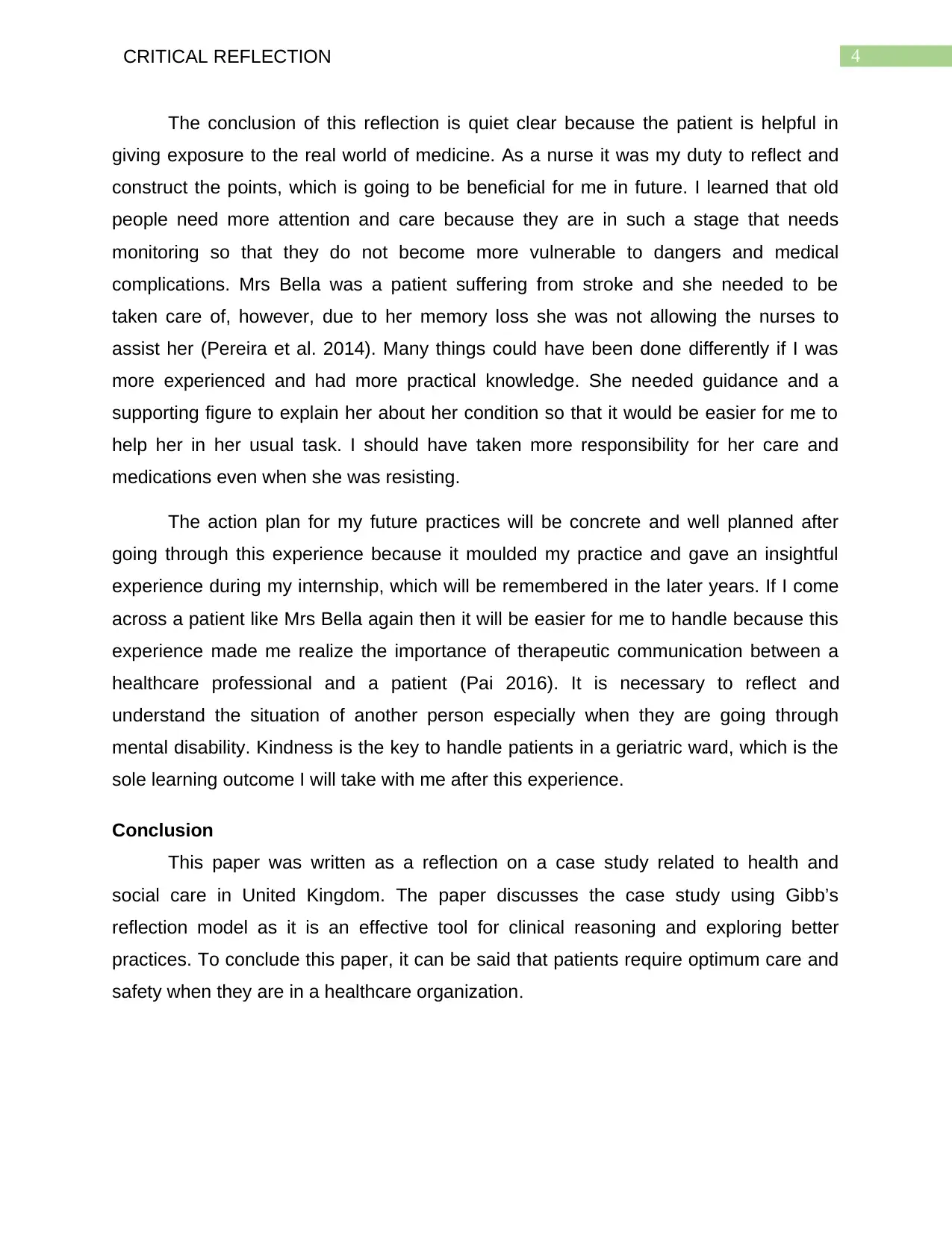
4CRITICAL REFLECTION
The conclusion of this reflection is quiet clear because the patient is helpful in
giving exposure to the real world of medicine. As a nurse it was my duty to reflect and
construct the points, which is going to be beneficial for me in future. I learned that old
people need more attention and care because they are in such a stage that needs
monitoring so that they do not become more vulnerable to dangers and medical
complications. Mrs Bella was a patient suffering from stroke and she needed to be
taken care of, however, due to her memory loss she was not allowing the nurses to
assist her (Pereira et al. 2014). Many things could have been done differently if I was
more experienced and had more practical knowledge. She needed guidance and a
supporting figure to explain her about her condition so that it would be easier for me to
help her in her usual task. I should have taken more responsibility for her care and
medications even when she was resisting.
The action plan for my future practices will be concrete and well planned after
going through this experience because it moulded my practice and gave an insightful
experience during my internship, which will be remembered in the later years. If I come
across a patient like Mrs Bella again then it will be easier for me to handle because this
experience made me realize the importance of therapeutic communication between a
healthcare professional and a patient (Pai 2016). It is necessary to reflect and
understand the situation of another person especially when they are going through
mental disability. Kindness is the key to handle patients in a geriatric ward, which is the
sole learning outcome I will take with me after this experience.
Conclusion
This paper was written as a reflection on a case study related to health and
social care in United Kingdom. The paper discusses the case study using Gibb’s
reflection model as it is an effective tool for clinical reasoning and exploring better
practices. To conclude this paper, it can be said that patients require optimum care and
safety when they are in a healthcare organization.
The conclusion of this reflection is quiet clear because the patient is helpful in
giving exposure to the real world of medicine. As a nurse it was my duty to reflect and
construct the points, which is going to be beneficial for me in future. I learned that old
people need more attention and care because they are in such a stage that needs
monitoring so that they do not become more vulnerable to dangers and medical
complications. Mrs Bella was a patient suffering from stroke and she needed to be
taken care of, however, due to her memory loss she was not allowing the nurses to
assist her (Pereira et al. 2014). Many things could have been done differently if I was
more experienced and had more practical knowledge. She needed guidance and a
supporting figure to explain her about her condition so that it would be easier for me to
help her in her usual task. I should have taken more responsibility for her care and
medications even when she was resisting.
The action plan for my future practices will be concrete and well planned after
going through this experience because it moulded my practice and gave an insightful
experience during my internship, which will be remembered in the later years. If I come
across a patient like Mrs Bella again then it will be easier for me to handle because this
experience made me realize the importance of therapeutic communication between a
healthcare professional and a patient (Pai 2016). It is necessary to reflect and
understand the situation of another person especially when they are going through
mental disability. Kindness is the key to handle patients in a geriatric ward, which is the
sole learning outcome I will take with me after this experience.
Conclusion
This paper was written as a reflection on a case study related to health and
social care in United Kingdom. The paper discusses the case study using Gibb’s
reflection model as it is an effective tool for clinical reasoning and exploring better
practices. To conclude this paper, it can be said that patients require optimum care and
safety when they are in a healthcare organization.
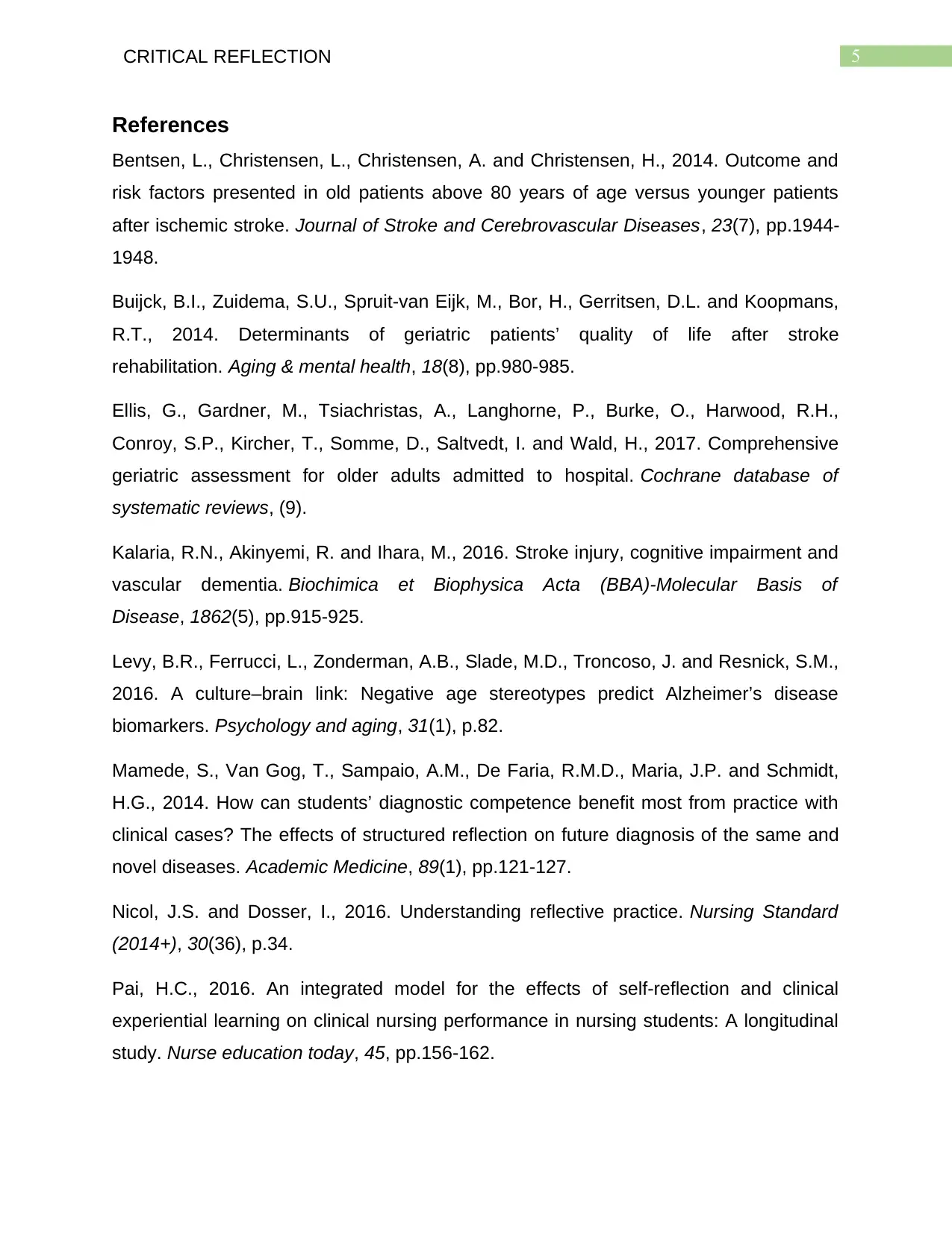
5CRITICAL REFLECTION
References
Bentsen, L., Christensen, L., Christensen, A. and Christensen, H., 2014. Outcome and
risk factors presented in old patients above 80 years of age versus younger patients
after ischemic stroke. Journal of Stroke and Cerebrovascular Diseases, 23(7), pp.1944-
1948.
Buijck, B.I., Zuidema, S.U., Spruit-van Eijk, M., Bor, H., Gerritsen, D.L. and Koopmans,
R.T., 2014. Determinants of geriatric patients’ quality of life after stroke
rehabilitation. Aging & mental health, 18(8), pp.980-985.
Ellis, G., Gardner, M., Tsiachristas, A., Langhorne, P., Burke, O., Harwood, R.H.,
Conroy, S.P., Kircher, T., Somme, D., Saltvedt, I. and Wald, H., 2017. Comprehensive
geriatric assessment for older adults admitted to hospital. Cochrane database of
systematic reviews, (9).
Kalaria, R.N., Akinyemi, R. and Ihara, M., 2016. Stroke injury, cognitive impairment and
vascular dementia. Biochimica et Biophysica Acta (BBA)-Molecular Basis of
Disease, 1862(5), pp.915-925.
Levy, B.R., Ferrucci, L., Zonderman, A.B., Slade, M.D., Troncoso, J. and Resnick, S.M.,
2016. A culture–brain link: Negative age stereotypes predict Alzheimer’s disease
biomarkers. Psychology and aging, 31(1), p.82.
Mamede, S., Van Gog, T., Sampaio, A.M., De Faria, R.M.D., Maria, J.P. and Schmidt,
H.G., 2014. How can students’ diagnostic competence benefit most from practice with
clinical cases? The effects of structured reflection on future diagnosis of the same and
novel diseases. Academic Medicine, 89(1), pp.121-127.
Nicol, J.S. and Dosser, I., 2016. Understanding reflective practice. Nursing Standard
(2014+), 30(36), p.34.
Pai, H.C., 2016. An integrated model for the effects of self-reflection and clinical
experiential learning on clinical nursing performance in nursing students: A longitudinal
study. Nurse education today, 45, pp.156-162.
References
Bentsen, L., Christensen, L., Christensen, A. and Christensen, H., 2014. Outcome and
risk factors presented in old patients above 80 years of age versus younger patients
after ischemic stroke. Journal of Stroke and Cerebrovascular Diseases, 23(7), pp.1944-
1948.
Buijck, B.I., Zuidema, S.U., Spruit-van Eijk, M., Bor, H., Gerritsen, D.L. and Koopmans,
R.T., 2014. Determinants of geriatric patients’ quality of life after stroke
rehabilitation. Aging & mental health, 18(8), pp.980-985.
Ellis, G., Gardner, M., Tsiachristas, A., Langhorne, P., Burke, O., Harwood, R.H.,
Conroy, S.P., Kircher, T., Somme, D., Saltvedt, I. and Wald, H., 2017. Comprehensive
geriatric assessment for older adults admitted to hospital. Cochrane database of
systematic reviews, (9).
Kalaria, R.N., Akinyemi, R. and Ihara, M., 2016. Stroke injury, cognitive impairment and
vascular dementia. Biochimica et Biophysica Acta (BBA)-Molecular Basis of
Disease, 1862(5), pp.915-925.
Levy, B.R., Ferrucci, L., Zonderman, A.B., Slade, M.D., Troncoso, J. and Resnick, S.M.,
2016. A culture–brain link: Negative age stereotypes predict Alzheimer’s disease
biomarkers. Psychology and aging, 31(1), p.82.
Mamede, S., Van Gog, T., Sampaio, A.M., De Faria, R.M.D., Maria, J.P. and Schmidt,
H.G., 2014. How can students’ diagnostic competence benefit most from practice with
clinical cases? The effects of structured reflection on future diagnosis of the same and
novel diseases. Academic Medicine, 89(1), pp.121-127.
Nicol, J.S. and Dosser, I., 2016. Understanding reflective practice. Nursing Standard
(2014+), 30(36), p.34.
Pai, H.C., 2016. An integrated model for the effects of self-reflection and clinical
experiential learning on clinical nursing performance in nursing students: A longitudinal
study. Nurse education today, 45, pp.156-162.
⊘ This is a preview!⊘
Do you want full access?
Subscribe today to unlock all pages.

Trusted by 1+ million students worldwide
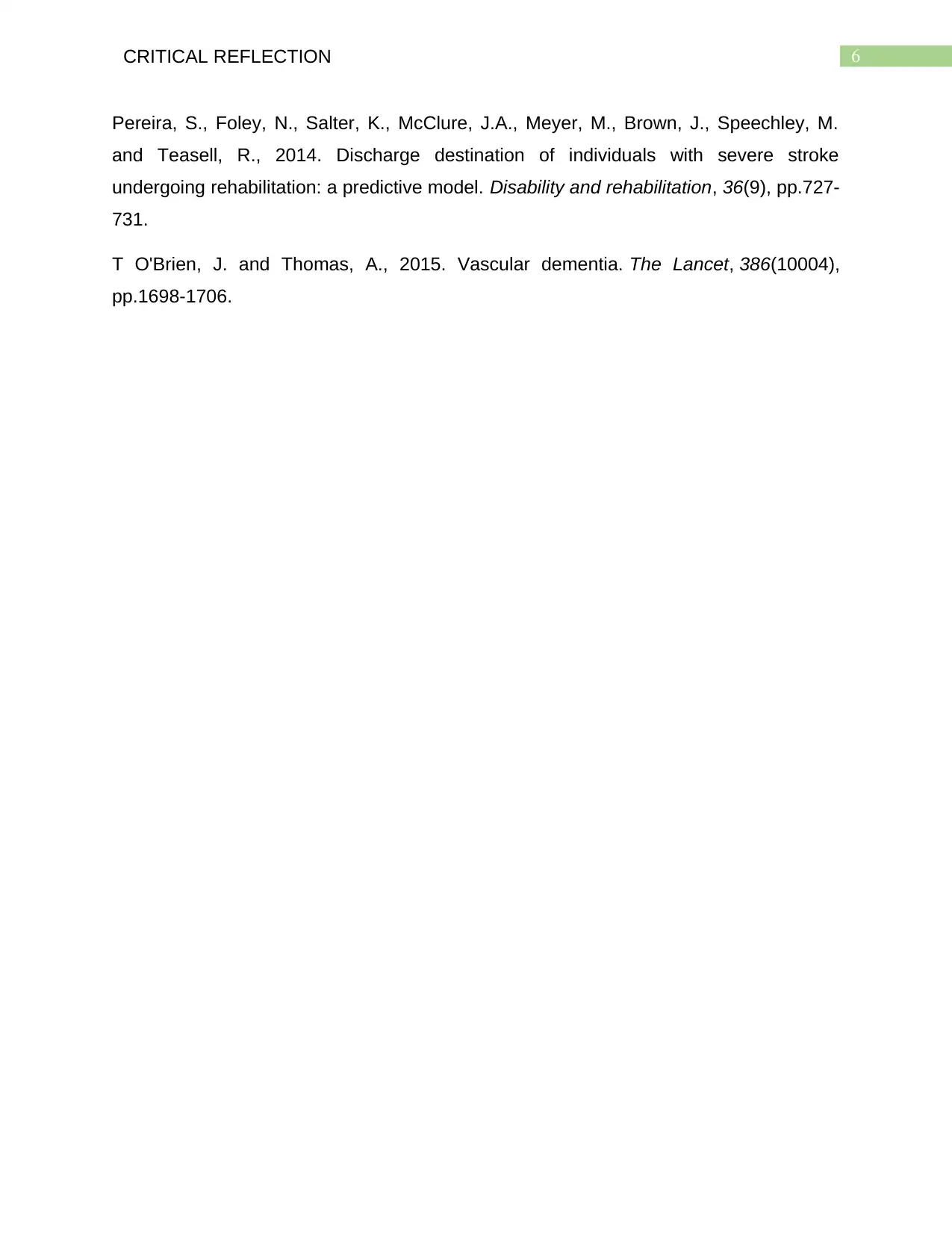
6CRITICAL REFLECTION
Pereira, S., Foley, N., Salter, K., McClure, J.A., Meyer, M., Brown, J., Speechley, M.
and Teasell, R., 2014. Discharge destination of individuals with severe stroke
undergoing rehabilitation: a predictive model. Disability and rehabilitation, 36(9), pp.727-
731.
T O'Brien, J. and Thomas, A., 2015. Vascular dementia. The Lancet, 386(10004),
pp.1698-1706.
Pereira, S., Foley, N., Salter, K., McClure, J.A., Meyer, M., Brown, J., Speechley, M.
and Teasell, R., 2014. Discharge destination of individuals with severe stroke
undergoing rehabilitation: a predictive model. Disability and rehabilitation, 36(9), pp.727-
731.
T O'Brien, J. and Thomas, A., 2015. Vascular dementia. The Lancet, 386(10004),
pp.1698-1706.
1 out of 7
Related Documents
Your All-in-One AI-Powered Toolkit for Academic Success.
+13062052269
info@desklib.com
Available 24*7 on WhatsApp / Email
![[object Object]](/_next/static/media/star-bottom.7253800d.svg)
Unlock your academic potential
Copyright © 2020–2026 A2Z Services. All Rights Reserved. Developed and managed by ZUCOL.





